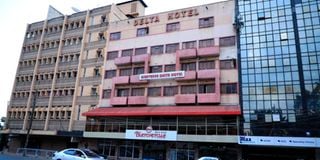Premium
Ferdinand Waititu on EACC radar again over mystery Sh2bn wealth

Former Kiambu governor Ferdinand Waititu.
The anti-corruption watchdog has filed a new case to recover unexplained wealth worth close to Sh2 billion from former Kiambu governor Ferdinand Waititu, who is fighting a case involving theft of public funds and abuse of office.
The case has also unmasked the rate at which Mr Waititu’s accumulated wealth since he rejoined Parliament in 2015 and later became governor in 2017. He was ousted in 2020 after impeachment by MCAs. EACC says he multiplied his wealth 17 times within five years. In a new case filed by the Ethics and Anti-Corruption Commission (EACC), the government seeks to recover houses, vehicles and money in banks owned by Mr Waititu, his wife Susan Wangari and their three trading companies.
The trading entities are listed as Saika Two Estate Developers limited, Bienvenue Delta Hotel and Bins Management Services Limited. The commission says the couple owns unexplained assets worth Sh1,937,709,376 amassed by Mr Waititu from 2015 when he was Kabete MP up to 2020 when he served as governor. The quickly built empire comprise landed property, luxurious vehicles and money transacted through bank accounts. He was Kabete MP from 2015 to 2017 and governor from 2017 to 2020.
According to EACC, during the period, Mr Waititu’s income from salary and legitimate business could not have exceeded Sh110 million. This means he made wealth that is 17 times more in less than five years.
The commission’s investigations established that Mr Waititu’s assets from known legitimate sources of income during the period under review are a net salary of Sh29,514,080, while from his legitimate businesses he earned a net income of Sh81,366,610.
When asked the source of the wealth, EACC says the couple failed to explain. On September 9, 2021, the commission says it issued notices to the couple and the firms to explain the disparity between their assets and known legitimate income sources.
“They have up to date not furnished the EACC with any explanation as to their sources of wealth, despite extension of period as requested by them and return of documents obtained during the search to enable them to do so,” says EACC lawyer Jacky Kibogy.

Delta Hotel on University Way. The hotel is owned by former Kiambu governor Ferdinand Waititu.
Pending determination of the forfeiture suit, EACC wants court to bar the couple and its agents from dealing with the assets. Court documents indicate that Mr Waititu amassed wealth that is not commensurate to his known and legitimate sources of income, from 2015 to 2020. EACC established that he operated eight bank accounts and one loan account under his name during the period.
Mr Waitutu acquired five luxury motor vehicles, 15 properties, including in upmarket suburbs of Runda, Migaa and Thindigua, and three multi-storey buildings in Nairobi’s city centre.
EACC alleges that Mr Waititu abused his position of trust as a public officer for private gain by engaging in transactions that were in conflict with public interest and amassed wealth by engaging in schemes to embezzle public funds through fictitious and fraudulent procurement contracts.
The assets that EACC is pursuing include multi-storey commercial buildings in Nairobi CBD such as Jamii Bora Building bought by Mr Waititu at Sh200 million, Delta Hotel (Sh380 million), Biashara Shopping Mall (Sh110 million), a house in Runda (Sh30 million) and Runda Grove (Sh96 million).
They own other multimillion-shilling prime properties and buildings across the Nairobi metropolis.
EACC says that among the questionable properties owned by Mr Waititu personally are 10 land parcels in Nairobi’s Kayole (two plots), Thindigua (two plots), Embakasi Ranching (two plots), Runda Grove, Migaa Estate, Lakisama and Kencom Sacco-Runda.
They are valued at Sh280.5 million. The two plots in Kayole, valued at Sh20 million, were registered in the name of Mr Waititu and two minors—E.N. and O.W.
The commission is also questioning acquisition of five vehicles, all registered in his name. They are two Toyota Land Cruisers, one Toyota Double Cabin, Toyota Probox and Toyota Vitz. EACC is also eyeing a sum of Sh804.6 million in his seven bank accounts.
EACC is further questioning his wife’s ownership of four pieces of land in Kajiado and Kabete valued at Sh19 million and a vehicle she co-owns with Ekeza Savings. Also in the list is Sh276.2 million in her three bank accounts. The wife is also the sole proprietor of two companies—Suwanga Limited and Connex Logistics Africa Limited that traded with the Kiambu government and received Sh16,423,418.
The other trading companies also own unexplained assets. For instance, Saika Two Estate Developers Limited owns five commercial buildings in Nairobi’s central business district—Bienvenue Delta Hotel, Biashara Street, Jamii Bora building, Solar House (partially paid for by Mr Waititu) and another one not named. The company purchased the houses between February 2017 and March 2018. It also has Sh164 million in its bank accounts. Bienvenue Delta Hotel has Sh67.6 million, according to EACC.
The legitimate businesses include rental incomes from Lexo Energy Kenya Limited for a leased plot being Shares in Homeway Poultry Farm Limited, Total Kenya Limited for leased plot Light Industry Kayole Shopping Centre and from a godown in Kayole by Meru Central Dairy Co-operative Union. Also in the list is rental incomes from Kayole Junction Property and Njiru Borehole, as well as property in Umoja Caltex Known as Reliance House.
“...he colluded with officials of the County Government of Kiambu to embezzle public funds through fictitious and fraudulent procurement contracts. He, in abuse of his position of trust, concealed or otherwise disguised his private interest in contracts awarded to companies contracted to offer services,” says EACC.





